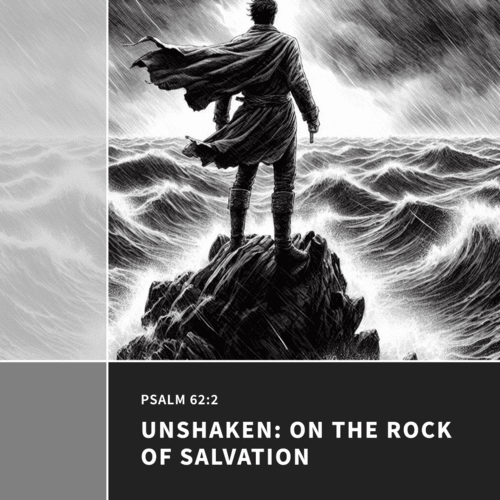What is the Sin That Leads to Death? Understanding 1 John 5:16
“These things I have written to you who believe in the name of the Son of God, that you may know that you have eternal life” (1 John 5:13). With these reassuring words, the apostle John declares the primary purpose of his first epistle—to give believers confidence in their salvation. Yet, just three verses later, the apostle makes one of the most disturbing declarations in the New Testament: “There is sin that leads to death; I do not say that one should pray for that” (1 John 5:16).
This startling statement raises profound questions. What is this sin that’s so severe that not even prayer should be offered? How can we reconcile this concept with the assurance of salvation that John so earnestly wants his readers to experience? And how should believers today understand this warning?
THE SIN THAT LEADS TO DEATH—TEXTUAL ANALYSIS
Original Greek Terminology:
The phrase “sin that leads to death” comes from the Greek “hamartia pros thanaton.” While Scripture teaches that all sin leads to death (Romans 6:23), John makes a distinctive point here by using “pros thanaton” (toward death). This construction suggests there is something about this sin he writes about, that’s beyond the general death-bringing nature of all sin. It points to a particularly severe form of sin that places the sinner beyond the reach of the church’s intercession. The text implies a spiritual condition so grave that John explicitly states he is not instructing believers to pray for those in such a state.
Within the broader context of 1 John, this passage appears amid discussions about life in Christ, victory over sin, and the assurance of salvation. The epistle consistently emphasises the relationship between faith, love, and obedience to God’s commands.
Context within 1 John
The discussion of sin leading to death must be understood within the letter’s overall themes. Throughout the epistle, John addresses:
- The reality of sin in believers’ lives (1 John 1:8-10)
- The provision of Christ’s advocacy and atonement (1 John 2:1-2)
- The incompatibility of habitual sin with genuine faith (1 John 3:4-10)
- The importance of love and obedience as marks of true faith (1 John 4:7-21)
HISTORICAL INTERPRETATIONS
Early Church Fathers’ Views: The Early Church Fathers offered various interpretations of this challenging passage. Origen suggested it referred to particularly grievous sins, while Augustine connected it to the unforgivable sin mentioned in the Gospels. Their interpretations often reflected their pastoral concerns and the theological challenges of their time.
The early interpreters generally agreed the “sin unto death” represented a serious spiritual condition rather than a single transgression, though they differed on its precise nature.
The Medieval and Reformation Understanding: During the medieval period, the Catholic Church developed its doctrine of mortal and venial sins, partly influenced by this passage. The Protestant Reformers later challenged this categorisation, emphasising instead the total depravity of sin while maintaining that some sins indeed carry graver consequences than others.
THE SIN THAT LEADS TO DEATH—MAJOR THEOLOGICAL INTERPRETATIONS
Mortal vs. Venial Sin Interpretation
The Catholic tradition distinguishes between mortal sins, which destroy God’s grace in the heart, and venial sins, which are less serious. This interpretation sees the “sin unto death” as referring to mortal sins that sever one’s relationship with God.
Strengths:
- Acknowledges biblical evidence that some sins carry graver consequences than others
- Provides a structured framework for understanding sin’s varying impacts
- Aligns with historical church teaching and tradition
Weaknesses:
- Creates an potentially arbitrary classification system not explicitly found in Scripture
- May lead to unhealthy scrupulosity and fear about categorising sins
- Doesn’t fully account for the finality implied in John’s instruction not to pray
- Risks minimising the seriousness of “lesser” sins
Specific Acts of Grave Sin
A second interpretation suggests John is referring to specific acts of sin so serious that they typically result in physical death as divine judgment, similar to the case of Ananias and Sapphira in Acts 5 or those taking communion unworthily in 1 Corinthians 11.
Strengths:
- Connects to clear biblical examples of sins resulting in physical death
- Provides concrete examples rather than abstract concepts
- Explains the immediate context of prayer for a “brother”
Weaknesses:
- Doesn’t fully account for the spiritual gravity implied in the passage
- Might lead to inappropriate speculation about whether specific sins qualify
- Doesn’t adequately explain why prayer would be forbidden
- Focuses more on consequences than on the nature of the sin itself
Deliberate Rejection of Christ and the Spirit’s Witness
This third interpretation, which combines elements of what has traditionally been called “blasphemy against the Holy Spirit” and “apostasy,” appears to be the most compelling explanation of the “sin unto death.” This view sees the sin that leads to death as a deliberate, persistent, and final rejection of Christ despite having experienced the Spirit’s testimony and convincing work.
Strengths:
- Directly connects to Jesus’s teaching about the unforgivable sin (Mark 3:28-30)
- Aligns with warnings in Hebrews 6:4-6 about those who fall away after having “tasted the heavenly gift”
- Explains why prayer would be ineffective—the person has completely rejected the only means of salvation
- Matches the gravity and finality of John’s warning
- Accounts for both the intellectual and experiential aspects of rejection
- Explains why this sin is uniquely fatal – it represents a conscious choice to reject known truth
Weaknesses:
- Can be difficult to precisely identify in practice
- Requires careful explanation to prevent misunderstanding and unfounded fears
- May raise questions about the security of believers
CONCLUSION
Among the three interpretations, the evidence most strongly favours the third—that the “sin unto death” is deliberate rejection of Christ despite having experienced the convincing work of the Holy Spirit. This understanding unifies what Scripture teaches about blasphemy against the Spirit and the warnings about apostasy, seeing them as two aspects of the same ultimate rejection of God’s truth.
This sin is “unto death” because it represents a decisive rejection of the only source of life—Christ himself—by someone who has experienced genuine spiritual enlightenment. It explains why John would instruct believers not to pray in such cases—not because God’s mercy is limited, but because the individual has completely and finally rejected the very means by which that mercy is received.
This interpretation should bring both sobriety and comfort to believers. Sobriety, because it reminds us of the serious danger of hardening our hearts against clear spiritual truth. Comfort, because those who’re concerned about having committed this sin demonstrate by their very concern that they have not done so—for such concern evidences continuing spiritual sensitivity.
THE SIN THAT LEADS TO DEATH—RELATED FAQs
Does the existence of a “sin unto death” contradict the doctrine of perseverance of the saints? No, the Reformed understanding sees this as evidence of false profession rather than true believers falling away. As Calvin notes, those who commit this sin reveal they were never truly regenerate, aligning with 1 John 2:19: “They went out from us, but they were not of us.”
What did John Calvin specifically say about this passage? Calvin interpreted this as referring to total apostasy by those who deliberately abandon the truth they once professed. In his commentary, he emphasises this sin can only be committed by those who had “received the knowledge of truth” but then wilfully reject it, distinguishing it from sins committed in ignorance.
How can we be sure someone has committed the sin unto death? The Reformed position generally maintains we cannot make this determination with absolute certainty about others. However, persistent, willful rejection of Christ, combined with a seared conscience and complete indifference toward spiritual things may indicate this condition.
If we’re not supposed to pray for those who commit this sin, should we stop evangelising to hostile atheists or apostates? No, since we cannot know with certainty who has committed this sin, we should continue evangelising to all. Reformed theologians emphasise the command not to pray refers specifically to those whom God has clearly given over to reprobation, which is not something we can discern definitively.
Does this passage imply that church discipline should treat some sins differently than others? While all sin requires discipline, the Reformed tradition recognizes degrees of censure based on the severity and nature of sin. However, any disciplinary action should aim at restoration unless there is clear, persistent rejection of Christ and refusal to repent.
How does this sin relate to God’s sovereignty in salvation? From a Reformed perspective, this sin represents the outworking of God’s decree regarding the reprobate. Those who commit it demonstrate that they were never among the elect, though their rejection remains their own responsible choice.
If someone fears they’ve committed this sin, what counsel would Reformed pastors typically give? Reformed pastors generally point out that genuine concern about having committed this sin is evidence that one has not committed it. True instances of the sin unto death are characterised by hardened indifference toward God rather than fear of having offended Him.
THE SIN THAT LEADS TO DEATH—OUR RELATED POSTS
Editor's Pick

Should We Stop Using Male Pronouns for God? Why Do We Say No?
A friend of ours arrived eagerly at his first theology class in seminary. But he quickly discovered something troubling: the [...]

Did Old Testament Law Force Women to Marry their Rapists?
**Editor’s Note: This post is part of our series, ‘Satan’s Lies: Common Deceptions in the Church Today’… Viral misinformation abounds [...]

From Danvers To Nashville: Two Statements, One Biblical Vision
30 years separate the Danvers Statement on Biblical Manhood and Womanhood (1987) and the Nashville Statement on Human Sexuality (2017). [...]

The Nashville Statement: Why Affirm It Despite Media Backlash?
WHY DO REFORMED CHRISTIANS STAND BY THIS STATEMENT ON MARRIAGE AND GENDER? When the Nashville Statement was released in 2017, [...]

Who Is Belial? Solving The 2 Corinthians 6:15 Mystery
Belial: This name from the pages of Scripture chills the soul. Who is this mysterious figure Paul invokes in 2 [...]

Celibacy Or Castration: What Jesus Really Means in Matthew 19:12
One of Scripture's most shocking misinterpretations led theologian Origen to castrate himself in the third century. His tragic mistake? Taking [...]

Philippians 4:13: Did Paul Really Mean We Can Do ALL Things?
"I can do all things through Christ who strengthens me." It's on gym walls, graduation cards, and motivational posters everywhere. [...]

The Ordinary Means of Grace: Why Are They Indispensable?
ORDINARY MEANS FOR EXTRAORDINARY TRANSFORMATION What if God's most powerful work in believers' lives happens through the most ordinary activities? [...]

Is the Bible God’s Word? Or Does It Only Contain God’s Word?
The authority of Scripture stands at the crossroads of modern Christianity. While some argue the Bible merely contains God’s Word [...]

Will We Remember This Life in Heaven? What Isaiah 65:17 Means
"Will I remember my spouse in heaven? My children? Will the joy we shared on earth matter in eternity?" These [...]
SUPPORT US:
Feel the Holy Spirit's gentle nudge to partner with us?
Donate Online:
Account Name: TRUTHS TO DIE FOR FOUNDATION
Account Number: 10243565459
Bank IFSC: IDFB0043391
Bank Name: IDFC FIRST BANK






